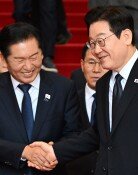[Editorial] Lee Young-hees Conceit Misleads the Nation
[Editorial] Lee Young-hees Conceit Misleads the Nation
Posted May. 19, 2007 04:06,
Gwon Ho Ung, North Korea`s chief delegate to the South-North ministerial summit, gave deep words of praise to Lee Young-hee, the progressive politician who went to Gaesong for the test-run of the train crossing between South and North Korea two days ago. I was very impressed by the essays written by Mr. Lee for the better of the nation regarding the complex situation concerning [North Koreas] withdrawal from the Non Proliferation Treaty (NPT) in 1994, said the North Korean delegation chief. Gwons comments vaguely refer to the arguments that Lee made in and around the first North Korean nuclear crisis in which the Bill Clinton administration even considered a military attack.
In many articles, Lee coherently backed North Korea, writing that, The attempts by North Korea to possess nuclear capability are to defend itself against nuclear threats from the U.S. In his article titled, PTSD Issues Concerning the U.S.-North Korea Nuclear Tensions (1992), he wrote, North Koreas abandonment of its nuclear capability wont necessarily lead the U.S. to modify its policies toward the nation. Once the [nuclear facilities] are revealed to international inspection, it becomes impossible in an actual sense to restart them. Then [North Korea] will be no more than a baby tiger with a tooth fallen out. What could this be other than a piece of advice that North Korea should not give up its nuclear capability?
The day before yesterday, as if excited by the appraisal by Kwon, Lee said, Those pupils and juniors Ive fostered for the last 2 to 3 decades now have control over South Korean society. What he said sounds like a self-praise about the fact that those who read his books during the 1970s and 1980s and were affected by the books are now the ones who have been playing with the core roles under the Roh Moo-hyun regime. It is true that recognition of the left-wing regime, which denies or degrades the orthodoxy and identity of South Korea, is grounded on Lees philosophies on history, unification and political systems.
Lee beautifully described North Korea as a society where the revolution for a new world and is high-spirited, and where those who lived in clover enjoying their power have been cleaned up. He has also asserted that the familiar depiction of the reality of the North Koreans, in such expressions as having only corn soup to eat and starved to bones-and-skins, is no more than a stereotype the South Korean powers that have injected into its people. He has never written a word about the hereditary group of Kim Il Sung and Kim Jong Il, who have reigned over 23 million civilians and have led many to starvation while the two themselves live in clover, purchasing all kinds of luxury goods from around the world. The spirits of North Koreans who have been sacrificed by starvation and political oppression will be much stirred to hear someone say that Lee Young-hee cares for the nation.
Even though the data from the former Soviet Union and other places proves that Kim Il-sungs regime in North Korea after independence was the result of the wishes of the Soviet occupation army, which plotted the division of the Korean peninsula, Lee does not say a word about that. He also strictly neglects the great achievements of South Korea, which accomplished its current status from the ruins of war caused by North Koreas invasion of the South.
While he fervently supported unification during the times when North Korea was in a superior position in the competition between the two Koreas, when the superiority of South Korea became manifest in early 1990s after the collapse of the Soviet Union and the eastern European satellites, he changed his attitude, saying, If the nation becomes unified in the current situation, the results will be unhappy. The unification has to be achieved by the internal power of the nation, gradually and rationally. It is necessary to give North Korea enough time to take care of its internal issues for the sake of the livelihood of its people. (1993, from an interview with Saenuri Newspaper.) Can it be any clearer that he is not hoping for unification based on a one market system and liberal democracy led by South Korea?
Lee was a fan of the Cultural Revolution, which was Mao Zedongs means of struggle for power. But when it became widely known that millions of people lost their lives due to the Cultural Revolution, all he did was say that there was a lack of information then.
Lee shows no signs of regretting what he has said and done: blurring Koreas national identity by wrongly assessing South Korean society and misleading uncountable youth. On the contrary he boasts that his pupils and juniors have seized control in South Korea. It is high time we re-grade the errors Lee has made carefully, one by one.





![트럼프의 그린란드 병합 의지, ‘이 사람’이 불씨 지폈다[지금, 이 사람]](https://dimg.donga.com/c/138/175/90/1/wps/NEWS/IMAGE/2026/01/20/133193287.1.jpg)

